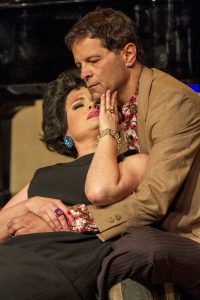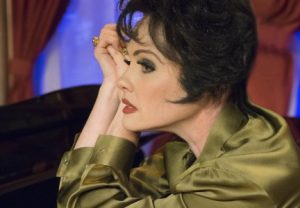Judy Garland Heads Toward End of the Rainbow
Peter Quilter’s play END OF THE RAINBOW, which follows dolefully a deteriorating Judy Garland down the wrong end of the yellow brick road, reeks of cult film.
That’s OK, just don’t expect much more.

Eileen Bowman and Jeffrey Jones in Intrepid Theatre’s End of the Rainbow. Daren Scott Photo
The scene is a cheesy London hotel suite in late 1968. In what would prove to be some of her last public appearances, Miss Garland is trudging through a five-week nightclub engagement, supported only by her prospective fifth husband, a marginal show biz gofer named Mickey Deans, and a pianist/musical director who’s an avatar for every swooning gay fan up to and including right now, as Intrepid Theatre Company’s new production in the downtown Lyceum Space demonstrates.
The show’s downhill trajectory is not to be altered, of course, no matter how hard Deans works to keep her focused or how yearning and compassionate the pianist waxes or even how gallantly Our Judy battles her accumulated addictions, preferences and ghosts. Within months, she will be dead of an overdose, at 47.
Meanwhile, there are sighs to be sighed, perhaps tears to be shed and music, still, to be made.
This show couldn’t happen without a plausible Judy. Thank you, Eileen Bowman, a singing actress of talent, intelligence, energy and timeless allure, who approaches the assignment as an interpretation, not an imitation.
There are layers upon layers in suggesting an icon. Garland famously grew up in the business, tirelessly illuminating films and the concert with astounding mastery at every level from nymphet to diva. Her distinctive style was such that, while she was singing, it was pretty much impossible to imagine any other version. Like the vast majority of the world, Eileen Bowman isn’t quite there, but she understands where “there” is and how best to suggest it.

Eileen Bowman as Judy Garland in End of the Rainbow. Daren Scott Photo.
Frankly, I’ll take the Bowman portrait as a done deal and not look further. Because there’s always the real thing available.
Yes, yes, we all know about “Somewhere Over the Rainbow.” But turn over an old copy of that recording (technological explanations available upon request) and check out the B-side, where a 14-year-old Judy sings “You Made Me Love You” to Clark Gable. Go ahead. Here’s the link:
Now that is Judy Garland in Uniqueland.
This play needs a lot of other help too, such as the services of a Chris O’Bryon, who not only plays piano with no discernable flaws and creates a dignified, adult version of what’s known now as a “fanboy” but also does it in a…serviceable British accent.
As the third leg of this wobbly stool, Jeffrey Jones skitters like a pinball bumping against pride, care-giving, fondness, lust, greed, self-preservation and, ultimately, near-terminal frustration. No favors from the author for this role, which is made to serve as a blanket indictment of Garland consumers. To be fair, there’s some of that in the pianist’s part too, but that’s more sad and fatalist. Deans is the brute who cares but fails; pianist is thwarted by fate.
All of this barely avoids tabloid level thanks to Intrepid’s director Christy Yael-Cox, who relies on a straight-ahead, reportorial staging, rich in careful details and stern at any hint of hope.
Michael McKeon’s hotel interior — dusty drapes and all – is frightfully accurate to the edge of depression; Curtis Mueller’s lighting is a champ at switching the scene to the nightclub stage; and Jeanne Reith’s costumes are out of those same sad tabloids.
Like the whole show.
But, darn it, I can’t just walk away from Judy Garland and London without telling a story. Immature was just fine in Shirley Temple’s Hollywood of the 1930s, and studios cultivated crops of maiden sparklers. In 1936, two of the best were Frances Gumm (renamed Judy Garland) and Deanna Durbin, possessed of a freakishly mature operatic soprano. The two were paired for an otherwise forgettable film about two girls who team up for a show to save Grandpa’s park orchestra. Here’s their duet:
https://www.youtube.com/watch?v=boz3a9NlPHY
Well, Durbin had a nice career but faded away and, in 1950, left Hollywood for Europe.
But the story I’ve heard, and never have been able to authenticate, is that the two women met in London sometime in the early 1950s, when Garland’s career was nearing its peak.
“How are you, Deanna?”
“I’m fine, Judy. Living quietly in France with my new husband and loving it. How about you?”
“Fabulous, actually. I’ve played to sold-out houses at the Palace Theatre and the London Palladium, I’ve won a special Tony Award, and there’s this film…”
Miss Durbin supposedly pulled back in amazement, then said:
“Judy! You’re still doing that stuff?!”
(Continues in the Lyceum Space downtown at 8 p.m. Thursdays-Saturdays; 4 p.m. Saturdays; and 2 p.m. Sundays through Nov. 29, 2015.)

Welton Jones has been following entertainment and the arts around for years, writing about them. Thirty-five of those years were spent at the UNION-TRIBUNE, the last decade was with SANDIEGO.COM.
